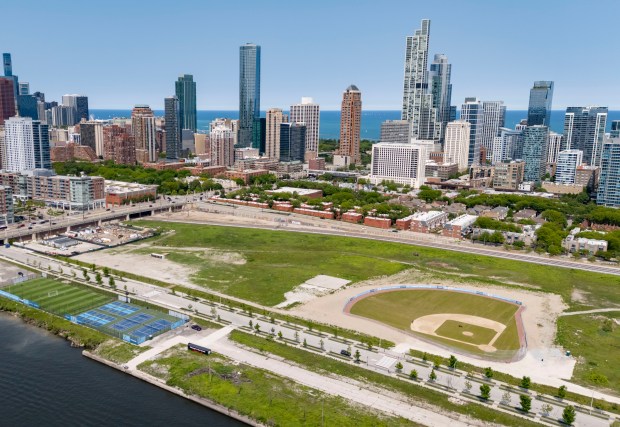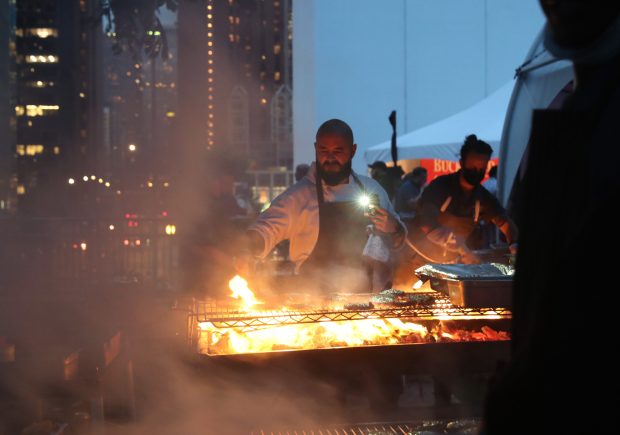Some documentarians settle for breaking your heart. Others struggle to clarify a long-view geopolitical panorama, with a specific subject or conflict as the viewfinder.
“No Other Land” achieves both, and more. It does so with deceptive ease under extraordinary duress. And foremost, it’s a riveting and humane experience pulled from the rubble of a never-ending war.
Premiering last year, it ended 2024 as the year’s most-awarded nonfiction film, a likely upcoming Oscar winner in the documentary feature category. “No Other Land” is also still without a U.S. distributor, so its producers are self-distributing. The Chicago premiere of this remarkable document, the work of four directors, opens Friday at the Music Box Theatre.
All four risked a great deal making it. Two of the directors are Palestinian: Basel Adra and Hamdan Ballal, residents of the Masafer Yatta region in the occupied West Bank. Masafer Yatta is made up of 20 small villages at the start of the film’s 2019-2022 timeline.
The other two directors are Israeli. Yuval Abraham works as a freelance journalist; Rachel Szor also served as the project’s primary cinematographer, with the four directors sharing co-writing and co-editing credits. At the heart of “No Other Land” lies the relationship between Adra and Abraham, two fiercely idealistic yet, in terms of circumstance, radically dissimilar young men whose dynamic — wary, friendly, relaxed, withholding — can never settle into place. The place in this documentary forbids it.
Adra, whose father has built a hilltop gas station beneath the family house, began filming the Israeli military occupation and gradual, haphazard Israeli military destruction of his village when he was 15. Earlier, in 1980, Israel began clearing Masafer Yatta for combat training. Israeli settlements sprouted near where the villages, such as Adra’s, existed for generations.
We see the expulsion of the Palestinians, and families such as Adra’s relocating to the caves beneath ground level. At one point, the family goes about its business while, against one cave wall, on the TV, a home-shopping channel offers a close-up of a flashy new exercise bike. The woman using it in the ad is, of course, stationary. It’s one of dozens of inevitable metaphors for these people’s painfully tight parameters of daily life.
The stress points between Adra, from the Palestinian territories, and Abraham, from Israel, are likewise inevitable. Abraham becomes part of the Masafer Yatta community in crisis, though many perceive him as a near-useless liberal media outsider who enjoys all the freedoms of movement the Palestinians lack. Early in the documentary, he’s described by someone as one of those “human-rights Israelis.”
Later in “No Other Land,” in a scene of brutal confrontation between the suddenly unhoused villagers and the occupying force, an unidentified Israeli officer pulls out his cellphone camera and films Abraham while he’s filming. The smiling officer makes sure to verbally identify him as “the Jew who is helping” the resistors.
The editing of these hours and years of footage must have been a monstrous challenge, and yet the 95 minutes of “No Other Land” feel extremely well-considered. We come to know the geographic and domestic particulars of Adra’s life, dominated by the little gas station on the hill. Families do not remain intact for long in this conflict. Some bits of conversation early in the film carry a grim, ironic undercurrent, as when Abraham (equally devoted to journalism and activism, to be clear) explains, with uncertain hope, that the right coverage of the forced resettlement will surely “force the United States to pressure Israel” into backing off.
The film’s five-year timeline confines so much in a larger, seemingly intractable war to a tight running time. Some may argue that the on-screen words, near the end, noting that the Oct. 7, 2023, Hamas massacre of Israeli citizens came after the film was essentially finished. So did Israeli’s retaliatory devastation of Gaza. And this: our president’s Feb. 4 suggestion, prior to his meeting with Israeli Prime Minister Benjamin Netanyahu, that the Palestinians should move on.
Long before this latest turn of events, “No Other Land” has drawn charges of antisemitism, and co-director Abraham, a major on-screen presence here, has drawn the same. Much of the first-rate work, in fiction and nonfiction alike, made by Israeli filmmakers over the last 20 years or so has provoked similar charges, particularly from Israeli cultural affairs offices. It’s the old story wrapped in misguided patriotism: As filmmakers, you’re either with your homeland, or you’re against it, and nuance be damned.
It’s hard not to think about the larger tangle of connected threads when watching any topical documentary of any origin, let alone a singular collaboration between Palestinian and Israeli filmmakers. That collaboration is plenty on its own. Its images, from the leveling of a village elementary school to the look in the eyes of a displaced child, may sound familiar, or even shameless, or manipulative? And yet they aren’t; there is tact and a humane perspective at work.
I found one moment in the film especially moving: a heated debate, surrounded by rubble, between Abraham and a villager. The villager tells him that they can never be friends. The Palestinian/Israeli divide is too deep. Then the debate’s interrupted by someone else calling for some help in a clean-up effort. The men stand up, and head off to help, together, promising to continue the debate on the way. No big deal moment, no heightened emphasis. Just two people, assigned the role of enemies, trying to be honest with each other.
It feels like a start.
“No Other Land” — 4 stars (out of 4)
No MPA rating (violence)
Running time: 1:35
How to watch: Premieres Feb. 7 at the Music Box Theatre, 3733 N. Southport Ave.; in Arabic, Hebrew and English with English subtitles.
Michael Phillips is a Tribune critic.




